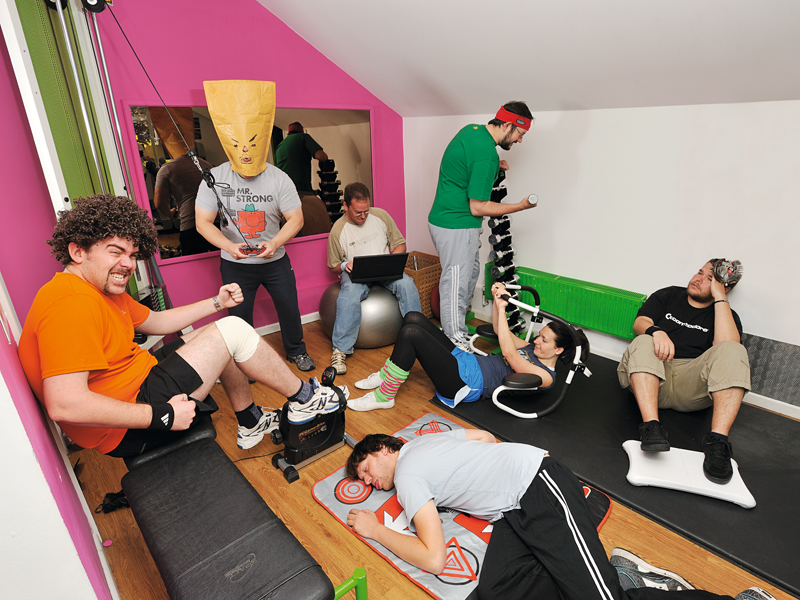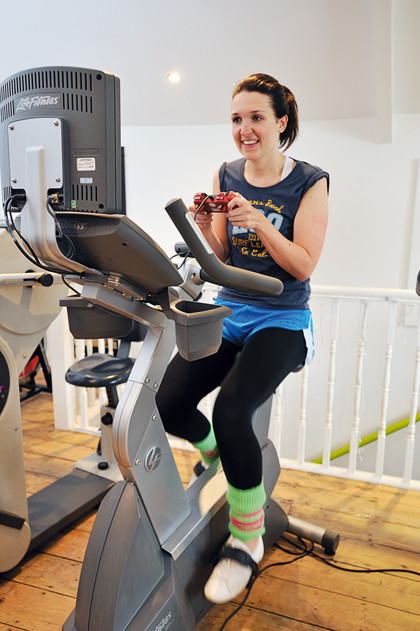Exercise games: can getting fit ever be fun?
They call it 'exergaming' - but does it beat a gym regime?

The world is divided into two camps – those who like to run around in public and those who don't.
Most of us would rather throw our PCs in the toilet than heave our bodies at high speed around the pavements with one finger ready and primed to dial 999.
So it was the latter camp that was relieved when the concept of the exercise game sidled onto the market. Everyone's heard of the idea. Hell, there's probably a hermit in the Himalayas who, even now, is powering up his yak-driven PC and stepping onto his dance mat.
Apparently there's even a proper term for it. A portmanteau of "exercise" and "gaming", which leads to "exergaming", a quite horrible term that will, no doubt, be popular at health and fitness symposiums.
Those who love their PCs generally do love their games so finding out that we can limit the terrifying expansion of our guts (beer and World of Warcraft are perfect bedmates) while enjoying some kickass killing time seems like the perfect solution.
Before you head on over to your nearest online store to buy the best in exergaming gear on the market, read on to find out if it's really good enough to rely on for your health.
Let's face it, one of the main reasons exergaming is so popular is because you, theoretically, don't notice you're exercising.
Get daily insight, inspiration and deals in your inbox
Sign up for breaking news, reviews, opinion, top tech deals, and more.
Amusingly calling it 'stealth' gaming, Mobilis, specialists in medical and sports healthcare, found that "exercise by itself is too much to bear in its intense format and certainly very hard to sustain", and while they are talking of using exergames in rehabilitation, they may as well be talking about anyone with a busy life and a short attention span.
Dr Alasdair Thin, lecturer in human physiology (his blog: The Quest for the Perfect ExerGame can be found here) at Heriot-Watt University in Edinburgh agrees. When asked why he thinks exergaming has become so popular he says:
"Fun. Fun. Fun. One of the attractions of exergaming is that the exercise is secondary to the game play and that you are sufficiently absorbed by the game play to the extent that you are less aware of the physical sensations of exertion."
It was in 1982, when Atari launched the joypad that exercise games first started to pick up speed, with inventions ranging from the bizarre to the insane marching happily into gullible living rooms. Consider the Atari Puffer (1982), Exus Foot Craz (a clear forerunner of the modern dance mat in 1987), Nintendo Power Pad (1988) and the horrifying Nintendo PowerGlove (1989).
Whoever got suckered into the PowerGlove would have only achieved Jean Claude van Damme status by dint of having to wave their arms about like epileptic octopi in order to orchestrate the simplest of moves.
PCs were not forgotten in the race to make us thin and the RacerMate CompuTrainer, powered by the Commodore 64, for cyclists was launched in 1986 and continues on today, although these are pricey toys for the more dedicated soul.

Then, of course, the darling of exergaming hit the arcades in 1998, Dance Dance Revolution. As addictive to watch as it was to play, DDR soon developed a massive following. Stories of weight loss and increased fitness began to infiltrate the media at high speed, with the developers themselves admitting to having lost weight while perfecting the product.
Shimmy it off
Sites like Get Up Move are packed with success stories, people talking about how much weight they've lost, how long it's taken them and what routines they followed.
The 2002 PC release was a hit – shy gamers could flail around in the privacy of their lounge while more confident fans could hold DDR parties ad nauseam.
The game is part social activity, part exercise routine and part gaming challenge; it's a unique cocktail that makes it addictive and entertaining enough to potentially work as an element of a daily exercise regime.